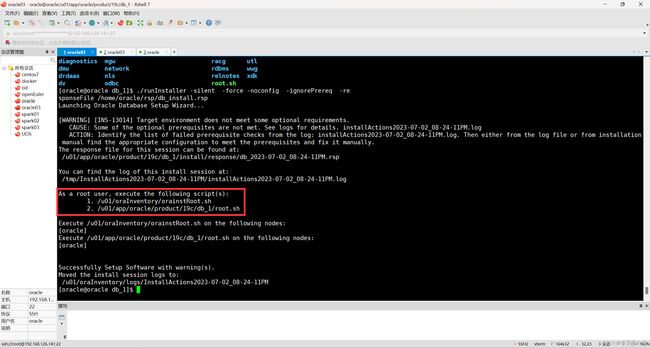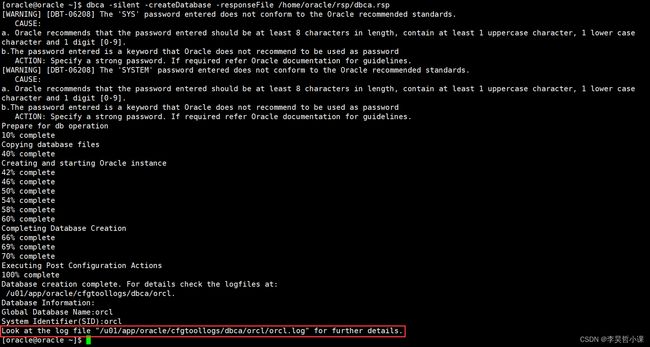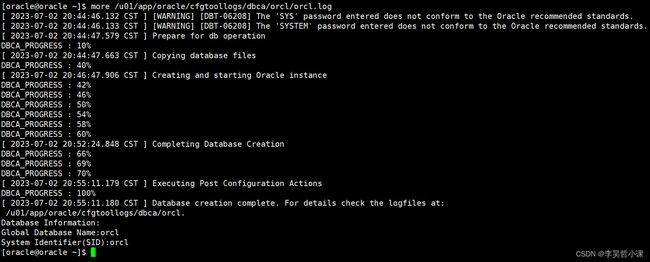CentOS7 静默方式安装 Oracle19C
CentOS7 静默方式安装 Oracle19C
操作系统:CentOS7
Oracle: 19C
安装常用工具和依赖
yum -y install vim tar net-tools wget perl python3 readline* deltarpm python-deltarpm \
zip unzip bc compat-libcap1* compat-libcap* binutils compat-libstdc++-33 \
elfutils-libelf elfutils-libelf-devel gcc gcc-c++ glibc-2.5 glibc-common glibc-devel \
glibc-headers ksh libaio libaio-devel libgcc libstdc++ libstdc++-devel make sysstat \
unixODBC unixODBC-devel binutils* compat-libstdc* elfutils-libelf* \
gcc* glibc* ksh* libaio* libgcc* libstdc* make* sysstat* libXp* glibc-kernheaders
绑定主机名和IP映射
# 修改主机名
hostnamectl set-hostname oracle
# 绑定主机名和IP映射
vim /etc/hosts
填写以下内容
192.168.126.141 oracle
建议重启服务器
reboot
修改LINUX的内核文件
vim /etc/sysctl.conf
追加以下内容
fs.file-max = 6815744
fs.aio-max-nr = 1048576
kernel.shmall = 67747971072
kernel.shmmax = 277495689510912
kernel.shmmni = 4096
kernel.sem = 250 32000 100 128
net.core.rmem_default = 262144
net.core.rmem_max = 4194304
net.core.wmem_default = 262144
net.core.wmem_max = 1048586
net.ipv4.tcp_max_tw_buckets = 6000
net.ipv4.ip_local_port_range = 9000 65500
net.ipv4.tcp_tw_recycle = 0
net.ipv4.tcp_tw_reuse = 1
net.core.netdev_max_backlog = 262144
net.ipv4.tcp_max_orphans = 262144
net.ipv4.tcp_max_syn_backlog = 262144
net.ipv4.tcp_synack_retries = 2
net.ipv4.tcp_syn_retries = 1
net.ipv4.tcp_fin_timeout = 1
net.ipv4.tcp_keepalive_time = 30
net.ipv4.tcp_keepalive_probes = 6
net.ipv4.tcp_keepalive_intvl = 5
net.ipv4.tcp_timestamps = 0
net.ipv4.conf.all.rp_filter = 2
net.ipv4.conf.default.rp_filter = 2
# net.core.somaxconn = 262144
修改后生成系统参数
sysctl -p
优化资源限制
vim /etc/security/limits.conf
追加以下内容
oracle soft nofile 1024
oracle hard nofile 65536
oracle soft nproc 16384
oracle hard nproc 16384
oracle soft stack 10240
oracle hard stack 32768
oracle hard memlock 134217728
oracle soft memlock 134217728
程序执行前认证设置
vim /etc/pam.d/login
追加以下内容
session required /lib/security/pam_limits.so
session required pam_limits.so
配置系统环境变量设置Oracle用户使用的ksh
vim /etc/profile
追加以下内容
if [ $USER = "oracle" ]; then
if [ $SHELL = "/bin/ksh" ]; then
ulimit -p 16384
ulimit -n 65536
else
ulimit -u 16384 -n 65536
fi
fi
当前会话全局环境变量生效
source /etc/profile
创建Oracle使用文件目录和相应的用户和密码
groupadd oinstall
groupadd dba
groupadd oper
useradd -g oinstall -G dba,oper oracle
passwd oracle
mkdir -p /u01/app/oracle /u01/oraInventory /u01/app/oracle/product/19c/db_1
chown -R oracle:oinstall /u01
chmod -R 775 /u01/app/oracle
配置oracle用户的环境变量
先切换到oracle用户
su - oracle
配置用户环境变量
vim .bash_profile
追加以下内容
export EDITOR=vim
export TMP=/tmp
export TMPDIR=$TMP
export ORACLE_SID=orcl
export ORACLE_BASE=/u01/app/oracle
export ORACLE_HOME=$ORACLE_BASE/product/19c/db_1
export INVENTORY_LOCATION=/u01/oraInventory
export TNS_ADMIN=$ORACLE_HOME/network/admin
export LD_LIBRARY_PATH=$ORACLE_HOME/lib
export NLS_LANG="AMERICAN_AMERICA.AL32UTF8"
export NLS_DATE_FORMAT="YYYY-MM-DD HH24:MI:SS"
export PATH=$ORACLE_HOME/bin:/bin:/usr/bin:/usr/sbin:/usr/local/bin:/usr/X11R6/bin:$PATH:$HOME/bin
umask 022
当前会话用户环境变量生效
source .bash_profile
上传Oracle安装包并解压
Oracle安装包上传至$ORACLE_HOME路径下
如果使用非oracle用户上传,切换到root用户下修改oralce安装包所有者
chown -R oracle:oinstall LINUX.X64_193000_db_home.zip
切换到oracle用户下解压
su - oracle
cd $ORACLE_HOME
或者 使用绝对路径
cd /u01/app/oracle/product/19c/db_1
解压
unzip LINUX.X64_193000_db_home.zip
准备静默安装文件
静默安装分为3步:
- 安装软件
- 创建监听
- DBCA创建数据库
以上3步分别需要三个配置文件,创建存放该3个文件的目录
使用oracle用户在用户主目录创建存放静默安装配置文件目录rsp
mkdir /home/oracle/rsp
如果该目录使用非oracle用户创建,切换到root用户下修改oralce安装包所有者
chown -R oracle:oinstall /home/oracle/rsp
安装Oracle软件
使用oracle用户编写软件安装静默配置文件
vim /home/oracle/rsp/db_install.rsp
内容如下:
####################################################################
## Copyright(c) Oracle Corporation 1998,2019. All rights reserved.##
## ##
## Specify values for the variables listed below to customize ##
## your installation. ##
## ##
## Each variable is associated with a comment. The comment ##
## can help to populate the variables with the appropriate ##
## values. ##
## ##
## IMPORTANT NOTE: This file contains plain text passwords and ##
## should be secured to have read permission only by oracle user ##
## or db administrator who owns this installation. ##
## ##
####################################################################
#------------------------------------------------------------------------------
# Do not change the following system generated value.
#------------------------------------------------------------------------------
oracle.install.responseFileVersion=/oracle/install/rspfmt_dbinstall_response_schema_v19.0.0
#-------------------------------------------------------------------------------
# Specify the installation option.
# It can be one of the following:
# - INSTALL_DB_SWONLY
# - INSTALL_DB_AND_CONFIG
#-------------------------------------------------------------------------------
oracle.install.option=INSTALL_DB_SWONLY
#-------------------------------------------------------------------------------
# Specify the Unix group to be set for the inventory directory.
#-------------------------------------------------------------------------------
UNIX_GROUP_NAME=oinstall
#-------------------------------------------------------------------------------
# Specify the location which holds the inventory files.
# This is an optional parameter if installing on
# Windows based Operating System.
#-------------------------------------------------------------------------------
INVENTORY_LOCATION=/u01/oraInventory
#-------------------------------------------------------------------------------
# Specify the complete path of the Oracle Home.
#-------------------------------------------------------------------------------
ORACLE_HOME=/u01/app/oracle/product/19c/db_1
#-------------------------------------------------------------------------------
# Specify the complete path of the Oracle Base.
#-------------------------------------------------------------------------------
ORACLE_BASE=/u01/app/oracle
#-------------------------------------------------------------------------------
# Specify the installation edition of the component.
#
# The value should contain only one of these choices.
# - EE : Enterprise Edition
# - SE2 : Standard Edition 2
#-------------------------------------------------------------------------------
oracle.install.db.InstallEdition=EE
###############################################################################
# #
# PRIVILEGED OPERATING SYSTEM GROUPS #
# ------------------------------------------ #
# Provide values for the OS groups to which SYSDBA and SYSOPER privileges #
# needs to be granted. If the install is being performed as a member of the #
# group "dba", then that will be used unless specified otherwise below. #
# #
# The value to be specified for OSDBA and OSOPER group is only for UNIX based #
# Operating System. #
# #
###############################################################################
#------------------------------------------------------------------------------
# The OSDBA_GROUP is the OS group which is to be granted SYSDBA privileges.
#-------------------------------------------------------------------------------
oracle.install.db.OSDBA_GROUP=dba
#------------------------------------------------------------------------------
# The OSOPER_GROUP is the OS group which is to be granted SYSOPER privileges.
# The value to be specified for OSOPER group is optional.
#------------------------------------------------------------------------------
oracle.install.db.OSOPER_GROUP=dba
#------------------------------------------------------------------------------
# The OSBACKUPDBA_GROUP is the OS group which is to be granted SYSBACKUP privileges.
#------------------------------------------------------------------------------
oracle.install.db.OSBACKUPDBA_GROUP=dba
#------------------------------------------------------------------------------
# The OSDGDBA_GROUP is the OS group which is to be granted SYSDG privileges.
#------------------------------------------------------------------------------
oracle.install.db.OSDGDBA_GROUP=dba
#------------------------------------------------------------------------------
# The OSKMDBA_GROUP is the OS group which is to be granted SYSKM privileges.
#------------------------------------------------------------------------------
oracle.install.db.OSKMDBA_GROUP=dba
#------------------------------------------------------------------------------
# The OSRACDBA_GROUP is the OS group which is to be granted SYSRAC privileges.
#------------------------------------------------------------------------------
oracle.install.db.OSRACDBA_GROUP=dba
################################################################################
# #
# Root script execution configuration #
# #
################################################################################
#-------------------------------------------------------------------------------------------------------
# Specify the root script execution mode.
#
# - true : To execute the root script automatically by using the appropriate configuration methods.
# - false : To execute the root script manually.
#
# If this option is selected, password should be specified on the console.
#-------------------------------------------------------------------------------------------------------
oracle.install.db.rootconfig.executeRootScript=false
如果该文件使用非oracle用户编写或上传,切换到root用户下修改oralce安装包所有者
chown -R oracle:oinstall /home/oracle/rsp/db_install.rsp
使用oracle用户进入$ORACLE_HOME目录后进行安装
./runInstaller -silent -force -noconfig -ignorePrereq -responseFile /home/oracle/rsp/db_install.rsp
根据提示:
As a root user, execute the following script(s): 1. /u01/oraInventory/orainstRoot.sh 2. /u01/app/oracle/product/19c/db_1/root.sh需要使用root用户依次执行以下两个脚本
/u01/oraInventory/orainstRoot.sh
/u01/app/oracle/product/19c/db_1/root.sh
根据提示检查
/u01/app/oracle/product/19c/db_1/install/root_oracle_2023-07-02_20-31-10-709893947.log
文件
more /u01/app/oracle/product/19c/db_1/install/root_oracle_2023-07-02_20-31-10-709893947.log
配置监听
使用oracle用户编写静默配置监听文件
vim /home/oracle/rsp/netca.rsp
内容如下:
######################################################################
## Copyright(c) 1998, 2018 Oracle Corporation. All rights reserved. ##
## ##
## Specify values for the variables listed below to customize your ##
## installation. ##
## ##
## Each variable is associated with a comment. The comment ##
## identifies the variable type. ##
## ##
## Please specify the values in the following format: ##
## ##
## Type Example ##
## String "Sample Value" ##
## Boolean True or False ##
## Number 1000 ##
## StringList {"String value 1","String Value 2"} ##
## ##
######################################################################
## ##
## This sample response file causes the Oracle Net Configuration ##
## Assistant (NetCA) to complete an Oracle Net configuration during ##
## a custom install of the Oracle12c server which is similar to ##
## what would be created by the NetCA during typical Oracle12c ##
## install. It also documents all of the NetCA response file ##
## variables so you can create your own response file to configure ##
## Oracle Net during an install the way you wish. ##
## ##
######################################################################
[GENERAL]
RESPONSEFILE_VERSION="19.0"
CREATE_TYPE="CUSTOM"
#-------------------------------------------------------------------------------
# Name : SHOW_GUI
# Datatype : Boolean
# Description: This variable controls appearance/suppression of the NetCA GUI,
# Pre-req : N/A
# Default : TRUE
# Note:
# This must be set to false in order to run NetCA in silent mode.
# This is a substitute of "/silent" flag in the NetCA command line.
# The command line flag has precedence over the one in this response file.
# This feature is present since 10.1.0.3.
#-------------------------------------------------------------------------------
#SHOW_GUI=false
#-------------------------------------------------------------------------------
# Name : LOG_FILE
# Datatype : String
# Description: If present, NetCA will log output to this file in addition to the
# standard out.
# Pre-req : N/A
# Default : NONE
# Note:
# This is a substitute of "/log" in the NetCA command line.
# The command line argument has precedence over the one in this response file.
# This feature is present since 10.1.0.3.
#-------------------------------------------------------------------------------
#LOG_FILE=""$ORACLE_BASE/cfgtoollogs/netca/netca.log""
[oracle.net.ca]
#INSTALLED_COMPONENTS;StringList;list of installed components
# The possible values for installed components are:
# "net8","server","client","aso", "cman", "javavm"
INSTALLED_COMPONENTS={"server","net8","javavm"}
#INSTALL_TYPE;String;type of install
# The possible values for install type are:
# "typical","minimal" or "custom"
INSTALL_TYPE=""typical""
#LISTENER_NUMBER;Number;Number of Listeners
# A typical install sets one listener
LISTENER_NUMBER=1
#LISTENER_NAMES;StringList;list of listener names
# The values for listener are:
# "LISTENER","LISTENER1","LISTENER2","LISTENER3", ...
# A typical install sets only "LISTENER"
LISTENER_NAMES={"LISTENER"}
#LISTENER_PROTOCOLS;StringList;list of listener addresses (protocols and parameters separated by semicolons)
# The possible values for listener protocols are:
# "TCP;1521","TCPS;2484","NMP;ORAPIPE","IPC;IPCKEY","VI;1521"
# For multiple listeners, separate them with commas ex "TCP;1521","TCPS;2484"
# For multiple protocols in single listener, separate them with "&" ex "TCP;1521&TCPS;2484"
# A typical install sets only "TCP;1521"
LISTENER_PROTOCOLS={"TCP;1521"}
#LISTENER_START;String;name of the listener to start, in double quotes
LISTENER_START=""LISTENER""
#NAMING_METHODS;StringList;list of naming methods
# The possible values for naming methods are:
# LDAP, TNSNAMES, ONAMES, HOSTNAME, NOVELL, NIS, DCE
# A typical install sets only: "TNSNAMES","ONAMES","HOSTNAMES"
# or "LDAP","TNSNAMES","ONAMES","HOSTNAMES" for LDAP
NAMING_METHODS={"TNSNAMES","ONAMES","HOSTNAME"}
#NOVELL_NAMECONTEXT;String;Novell Directory Service name context, in double quotes
# A typical install does not use this variable.
#NOVELL_NAMECONTEXT = ""NAMCONTEXT""
#SUN_METAMAP;String; SUN meta map, in double quotes
# A typical install does not use this variable.
#SUN_METAMAP = ""MAP""
#DCE_CELLNAME;String;DCE cell name, in double quotes
# A typical install does not use this variable.
#DCE_CELLNAME = ""CELL""
#NSN_NUMBER;Number;Number of NetService Names
# A typical install sets one net service name
NSN_NUMBER=1
#NSN_NAMES;StringList;list of Net Service names
# A typical install sets net service name to "EXTPROC_CONNECTION_DATA"
NSN_NAMES={"EXTPROC_CONNECTION_DATA"}
#NSN_SERVICE;StringList;Oracle12c database's service name
# A typical install sets Oracle12c database's service name to "PLSExtProc"
NSN_SERVICE={"PLSExtProc"}
#NSN_PROTOCOLS;StringList;list of coma separated strings of Net Service Name protocol parameters
# The possible values for net service name protocol parameters are:
# "TCP;HOSTNAME;1521","TCPS;HOSTNAME;2484","NMP;COMPUTERNAME;ORAPIPE","VI;HOSTNAME;1521","IPC;IPCKEY"
# A typical install sets parameters to "IPC;EXTPROC"
NSN_PROTOCOLS={"TCP;HOSTNAME;1521"}
#SERVICEUSERPASSWORD;String;Windows service user password
# If the oracle home is installed as secure user, supply the password
#SERVICEUSERPASSWORD=""svcpassword""
如果该文件使用非oracle用户编写或上传,切换到root用户下修改oralce安装包所有者
chown -R oracle:oinstall /home/oracle/rsp/netca.rsp
使用oracle用户进行静默监听配置
netca -silent -responsefile /home/oracle/rsp/netca.rsp
检查监听状态
lsnrctl status
静默创建数据库
使用oracle用户编写静默创建数据库文件
vim /home/oracle/rsp/dbca.rsp
内容如下:
##############################################################################
## ##
## DBCA response file ##
## ------------------ ##
## Copyright(c) Oracle Corporation 1998,2019. All rights reserved. ##
## ##
## Specify values for the variables listed below to customize ##
## your installation. ##
## ##
## Each variable is associated with a comment. The comment ##
## can help to populate the variables with the appropriate ##
## values. ##
## ##
## IMPORTANT NOTE: This file contains plain text passwords and ##
## should be secured to have read permission only by oracle user ##
## or db administrator who owns this installation. ##
##############################################################################
#-------------------------------------------------------------------------------
# Do not change the following system generated value.
#-------------------------------------------------------------------------------
responseFileVersion=/oracle/assistants/rspfmt_dbca_response_schema_v19.0.0
#-----------------------------------------------------------------------------
# Name : gdbName
# Datatype : String
# Description : Global database name of the database
# Valid values : . - when database domain isn't NULL
# - when database domain is NULL
# Default value : None
# Mandatory : Yes
#-----------------------------------------------------------------------------
gdbName=orcl
#-----------------------------------------------------------------------------
# Name : sid
# Datatype : String
# Description : System identifier (SID) of the database
# Valid values : Check Oracle19c Administrator's Guide
# Default value : specified in GDBNAME
# Mandatory : No
#-----------------------------------------------------------------------------
sid=orcl
#-----------------------------------------------------------------------------
# Name : databaseConfigType
# Datatype : String
# Description : database conf type as Single Instance, Real Application Cluster or Real Application Cluster One Nodes database
# Valid values : SI\RAC\RACONENODE
# Default value : SI
# Mandatory : No
#-----------------------------------------------------------------------------
databaseConfigType=SI
templateName=General_Purpose.dbc
#-----------------------------------------------------------------------------
# Name : createAsContainerDatabase
# Datatype : boolean
# Description : flag to create database as container database
# Valid values : Check Oracle19c Administrator's Guide
# Default value : false
# Mandatory : No
#-----------------------------------------------------------------------------
createAsContainerDatabase=false
#-----------------------------------------------------------------------------
# Name : sysPassword
# Datatype : String
# Description : Password for SYS user
# Valid values : Check Oracle19c Administrator's Guide
# Default value : None
# Mandatory : Yes
#-----------------------------------------------------------------------------
sysPassword=oracle
#-----------------------------------------------------------------------------
# Name : systemPassword
# Datatype : String
# Description : Password for SYSTEM user
# Valid values : Check Oracle19c Administrator's Guide
# Default value : None
# Mandatory : Yes
#-----------------------------------------------------------------------------
systemPassword=oracle
#-----------------------------------------------------------------------------
# Name : datafileDestination
# Datatype : String
# Description : Location of the data file's
# Valid values : Directory for all the database files
# Default value : $ORACLE_BASE/oradata
# Mandatory : No
#-----------------------------------------------------------------------------
datafileDestination=/u01/app/oracle/oradata
#-----------------------------------------------------------------------------
# Name : storageType
# Datatype : String
# Description : Specifies the storage on which the database is to be created
# Valid values : FS (CFS for RAC), ASM
# Default value : FS
# Mandatory : No
#-----------------------------------------------------------------------------
storageType=FS
#-----------------------------------------------------------------------------
# Name : sampleSchema
# Datatype : Boolean
# Description : Specifies whether or not to add the Sample Schemas to your database
# Valid values : TRUE \ FALSE
# Default value : FASLE
# Mandatory : No
#-----------------------------------------------------------------------------
sampleSchema=TRUE
#-----------------------------------------------------------------------------
# Name : databaseType
# Datatype : String
# Description : used for memory distribution when memoryPercentage specified
# Valid values : MULTIPURPOSE|DATA_WAREHOUSING|OLTP
# Default value : MULTIPURPOSE
# Mandatory : NO
#-----------------------------------------------------------------------------
databaseType=OLTP
#-----------------------------------------------------------------------------
# Name : automaticMemoryManagement
# Datatype : Boolean
# Description : flag to indicate Automatic Memory Management is used
# Valid values : TRUE/FALSE
# Default value : TRUE
# Mandatory : NO
#-----------------------------------------------------------------------------
automaticMemoryManagement=FALSE
#-----------------------------------------------------------------------------
# Name : totalMemory
# Datatype : String
# Description : total memory in MB to allocate to Oracle
# Valid values :
# Default value :
# Mandatory : NO
#-----------------------------------------------------------------------------
totalMemory=4096
如果该文件使用非oracle用户编写或上传,切换到root用户下修改oralce安装包所有者
chown -R oracle:oinstall /home/oracle/rsp/dbca.rsp
使用oracle用户进行静默方式创建数据库
dbca -silent -createDatabase -responseFile /home/oracle/rsp/dbca.rsp
安装完成可以查看/u01/app/oracle/cfgtoollogs/dbca/orcl/orcl.log文件,检查安装细节
安装rlwrap
在Linux下面使用sqlplus很不方便,上下键,退格键都不能用,严重降低生产效率。
为了linux下的sqlplus方便调用历史命令和退格,安装rlwrap
下载源代码使用root用户编译安装
tar -zxvf rlwrap-0.45.2.tar.gz
cd rlwrap-0.45.2
./configure
make -j8
make install
切换到oracle用户配置用户环境变量支持rlwrap
su - oracle
vim /home/oracle/.bash_profile
追加以下内容:
alias sqlplus='rlwrap sqlplus'
alias rman='rlwrap rman'
alias lsnrctl='rlwrap lsnrctl'
当前会话用户环境变量生效
source /home/oracle/.bash_profile
sqlplus连接数据库
使用oracle用户操作
sqlplus / as sysdba
conn / as sysdba;
select userenv('language') from dual;
select * from nls_database_parameters;
select * from V$NLS_PARAMETERS;
select status from v$instance;
alter user hr account unlock;
alter user hr identified by hr;
conn hr/hr;
set linesize 300;
set pagesize 300;
conn sys/oracle@orcl as sysdba;
conn hr/hr@orcl;
select tname from tab;
# 关闭监听
lsnrctl stop
-- 关闭数据库
shutdown immediate;
-- 开启数据库
startup;
# 关闭监听
lsnrctl start
开发防火墙端口
使用root用户
firewall-cmd --zone=public --add-port=1521/tcp --permanent
firewall-cmd --reload
–zone #作用域
–add-port=1521/tcp #添加端口,格式为:端口/通讯协议
–permanent #永久生效,没有此参数重启后失效
sqldeveloper连接oracle
使用sys账户连接orcl实例
使用hr账户连接orcl实例











